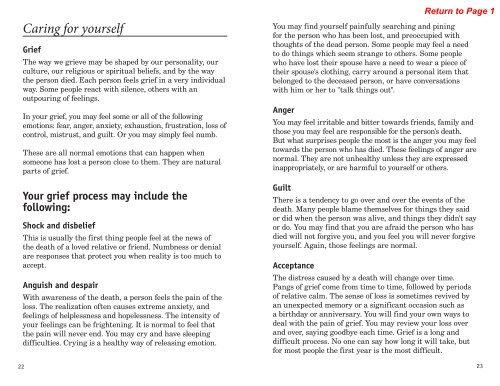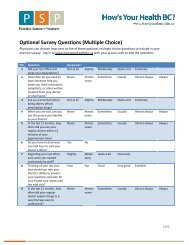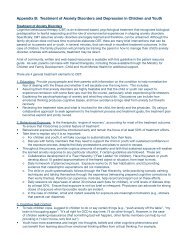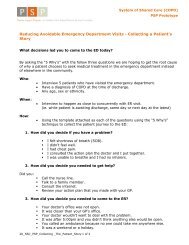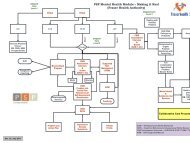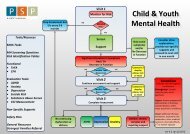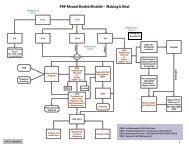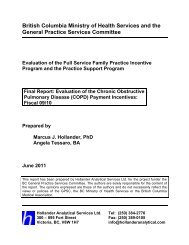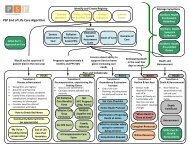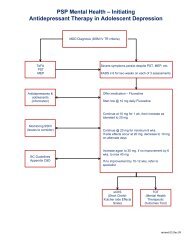PSP End of Life Care Algorithm - GPSC
PSP End of Life Care Algorithm - GPSC
PSP End of Life Care Algorithm - GPSC
Create successful ePaper yourself
Turn your PDF publications into a flip-book with our unique Google optimized e-Paper software.
Caring for yourselfGriefThe way we grieve may be shaped by our personality, ourculture, our religious or spiritual beliefs, and by the waythe person died. Each person feels grief in a very individualway. Some people react with silence, others with anoutpouring <strong>of</strong> feelings.In your grief, you may feel some or all <strong>of</strong> the followingemotions: fear, anger, anxiety, exhaustion, frustration, loss <strong>of</strong>control, mistrust, and guilt. Or you may simply feel numb.These are all normal emotions that can happen whensomeone has lost a person close to them. They are naturalparts <strong>of</strong> grief.Your grief process may include thefollowing:Shock and disbeliefThis is usually the first thing people feel at the news <strong>of</strong>the death <strong>of</strong> a loved relative or friend. Numbness or denialare responses that protect you when reality is too much toaccept.Anguish and despairWith awareness <strong>of</strong> the death, a person feels the pain <strong>of</strong> theloss. The realization <strong>of</strong>ten causes extreme anxiety, andfeelings <strong>of</strong> helplessness and hopelessness. The intensity <strong>of</strong>your feelings can be frightening. It is normal to feel thatthe pain will never end. You may cry and have sleepingdifficulties. Crying is a healthy way <strong>of</strong> releasing emotion.You may find yourself painfully searching and piningfor the person who has been lost, and preoccupied withthoughts <strong>of</strong> the dead person. Some people may feel a needto do things which seem strange to others. Some peoplewho have lost their spouse have a need to wear a piece <strong>of</strong>their spouse's clothing, carry around a personal item thatbelonged to the deceased person, or have conversationswith him or her to "talk things out".AngerYou may feel irritable and bitter towards friends, family andthose you may feel are responsible for the person's death.But what surprises people the most is the anger you may feeltowards the person who has died. These feelings <strong>of</strong> anger arenormal. They are not unhealthy unless they are expressedinappropriately, or are harmful to yourself or others.GuiltThere is a tendency to go over and over the events <strong>of</strong> thedeath. Many people blame themselves for things they saidor did when the person was alive, and things they didn't sayor do. You may find that you are afraid the person who hasdied will not forgive you, and you feel you will never forgiveyourself. Again, those feelings are normal.AcceptanceThe distress caused by a death will change over time.Pangs <strong>of</strong> grief come from time to time, followed by periods<strong>of</strong> relative calm. The sense <strong>of</strong> loss is sometimes revived byan unexpected memory or a significant occasion such asa birthday or anniversary. You will find your own ways todeal with the pain <strong>of</strong> grief. You may review your loss overand over, saying goodbye each time. Grief is a long anddifficult process. No one can say how long it will take, butfor most people the first year is the most difficult.22 23


